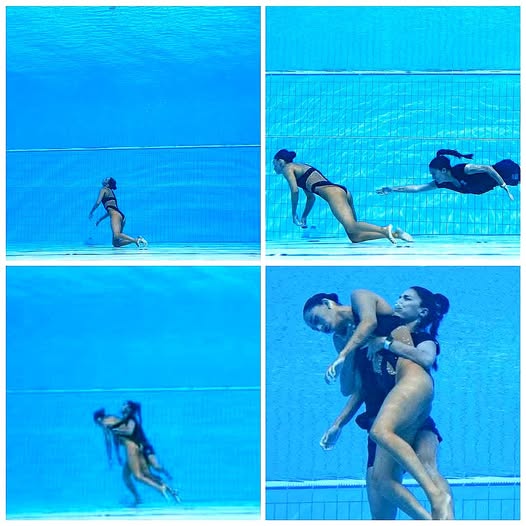It was June 2022, in Budapest. The pool glistened beneath the bright lights of the World Aquatics Championships. The crowd was hushed with awe and anticipation, their eyes following the mesmerizing movements of a lone figure in the water. Anita Álvarez, an American artistic swimmer of Mexican heritage, performed with a grace that seemed otherworldly. Every limb extended like a brushstroke, every breath disguised in the illusion of ease. Her routine was flawless, even poetic.
But when the final note faded and the performance ended, something was wrong. Something was terribly wrong.

Anita did not surface.
Her body, still elegant in its posture, began to float—lifeless. And then, silently, it sank. Slowly. Gently. All the way to the bottom of the pool. There was no panic. No flailing. No splash to signal distress. The crowd, swept away by the spectacle, applauded. The judges took notes, possibly with expressions of admiration. Cameras rolled. Smiles were shared.
And she was drowning.
No one saw it. No one except one person—her coach, Andrea Fuentes.
Fuentes, a four-time Olympic medalist herself, wasn’t clapping. She wasn’t smiling. Because she knew. She knew something wasn’t right. She had watched Anita rehearse countless times. She knew the exact rhythm of her breathing, the timing of her emergence. And when those seconds passed—those few seconds that seemed nothing to the crowd but felt like an eternity to her—Fuentes acted.
Without a moment’s hesitation, she dove in, fully dressed. No time to remove her shoes. No time to shout for help. No time to think. She simply moved. Her instinct was immediate. She swam straight to the bottom of the pool and cradled Anita by the waist, pulling her lifeless body back to the surface, gasping for life.
She saved her.
And the world, stunned, finally realized what had just unfolded. Not just a medical emergency—but something much more profound. A lesson. A revelation. A mirror.
The Invisible Struggle Beneath the Surface
We often think of drowning as something dramatic. Arms thrashing, voices screaming, a visible and undeniable emergency. But in reality, drowning is quiet. There’s no splashing. No cries for help. Just silence. Stillness. Disappearance.
That is how emotional and psychological struggles manifest in so many lives.
People perform every day. At work, in relationships, on social media. They smile, they entertain, they achieve. To the world, it looks flawless—perhaps even enviable. But beneath the surface, they’re gasping. Suffocating under invisible weights. Exhausted by expectations, trapped in cycles of performance and perfection.
We clap. We scroll. We admire. But do we see?
Who among us can say they’d notice when someone starts to sink? When their light dims just slightly? When their eyes smile a second too late? When the silence in their laughter isn’t joy, but fatigue?
Anita Álvarez’s story is not just about a swimming accident. It’s about recognition. Intuition. Connection. It’s about how rare and vital it is to be seen—not just observed, but truly noticed. And it compels us to ask a question most of us are too afraid to confront:
Who would dive in for you?
The Sacred Gift of Being Known
Andrea Fuentes noticed because she knew Anita. Their relationship was built not just on performance metrics but on trust, attention, and emotional awareness. She didn’t wait for confirmation. She didn’t need evidence. She acted because something inside her said, She’s not okay.
This raises a sobering truth: most of us go through life surrounded by people who see our surface but never truly understand our depths.
In a world dominated by curated lives and filtered realities, it’s increasingly difficult to let people in—to be vulnerable enough to say, “I’m not okay.” And even when we do, it’s often met with surface-level platitudes, rushed reassurances, or even discomfort. Because let’s face it: many people are not equipped to deal with someone else’s emotional drowning. They’re busy clapping at the show.
Being known—really known—is one of the most sacred gifts a human can experience. It’s rare. It’s precious. And it’s often found not in the crowd, but in the one person who watches with their heart.
Would You Dive In?
This story also demands reflection in reverse.
Would you dive in for someone?
If your friend, partner, sibling, or colleague began to sink—silently, subtly—would you recognize the signs? Would you know them well enough to notice the pause in their speech, the tremor in their smile, the longer-than-usual silence?
And if you did notice, would you have the courage to act?
It’s easy to be a spectator. Easy to admire someone’s strength, talent, resilience—until that very strength becomes a mask hiding their suffering. It’s easy to clap for the performance. Much harder to pause and ask, “Hey, are you really okay?”
Real love is not about grand gestures. It’s about presence. Attunement. Consistency. It’s about noticing the little things—like when someone no longer replies with emojis, or stops posting photos, or laughs without warmth. It’s about saying, “I saw the way you looked away today. Talk to me.”
To dive in requires risk. Vulnerability. It means getting uncomfortable. But sometimes, that’s what love looks like—fully clothed, shoes and all, leaping into the deep end for someone who cannot save themselves.
Clapping at the Edge of Tragedy
The image of the audience applauding while Anita was sinking is haunting. It’s not malicious. It’s human. We are conditioned to see the performance and miss the pain. We celebrate strength, endurance, composure—often at the expense of well-being.
How many people in your life are clapping while you’re drowning? How many are you clapping for, without realizing they’re struggling to breathe?
The truth is, most of us are taught to suffer silently. To keep going. To “be strong.” And when we finally collapse—emotionally, physically, spiritually—it shocks everyone. “But they seemed so happy!” “She was always smiling.” “He was doing so well.”
No one noticed the slow descent. No one noticed the sinking.
We need a culture that values checking in over checking out. That prioritizes presence over performance. That recognizes that sometimes, the strongest-looking people are the ones who need the most support.
The Courage to Save—and to Be Saved
Fuentes didn’t wait for permission. She didn’t wait for confirmation. She trusted her knowing, and she acted.
But how many of us hesitate?
We see someone change—become withdrawn, anxious, erratic—but we rationalize it. “They’re just busy.” “They’ll be fine.” “It’s not my place.” And so, we let them drown in plain sight.
Why?
Because intervening is hard. It feels intrusive. We’re afraid of overstepping. Afraid of hearing something we can’t fix.
But sometimes, saving someone isn’t about having the answers. It’s about showing up. Being there. Saying, “I’m not leaving you alone in this.” That’s what Fuentes did. And that’s what we can do for each other.
On the flip side, there’s also courage in letting yourself be saved. To say, “I’m not okay.” To stop performing and start being real. That vulnerability is terrifying—but it’s also the first step toward healing.
You don’t have to carry it all alone.
Becoming the One Who Notices
So, how do we become the person who notices?
It starts with slowing down. Listening more. Observing without judgment. Cultivating emotional literacy—noticing tone, energy, language. Asking twice, when someone says they’re fine.
It means prioritizing depth over surface. Choosing connection over convenience. Creating space in our relationships for honesty, not just harmony.
It means making check-ins a habit, not just a crisis response.
Sometimes, noticing is as simple as remembering their favorite coffee order, or the day their dog passed away. It’s about being attuned to patterns, disruptions, rhythms.
And yes—it’s about trusting your gut. If you feel something’s off, say something. Do something.
Because if you don’t, who will?
Final Reflections: The Deep End of Being Human
Anita Álvarez recovered. She returned to competition. Her story became global news—not just because of the near-tragedy, but because of the profound humanity it revealed.
We are all swimming through something.
Some days, the water is calm. Other days, the current is strong. But every one of us needs a Fuentes in our lives—someone who pays attention, who knows our rhythms, who dives in without hesitation.
And maybe, just maybe, we can become that person for someone else.
Because in the end, the greatest acts of love are not always the loudest. Sometimes, they’re silent. Urgent. Clothed in instinct and courage. Like a coach diving into a pool. Like a hand reaching into the dark.
So ask yourself today:
Who do I need to check in on?
Who’s clapping while I’m sinking?
Who would I dive in for, fully clothed, no questions asked?
And most importantly:
Who knows me well enough to notice when I don’t come up for air?
Don’t just watch. Don’t just applaud.
Notice.


